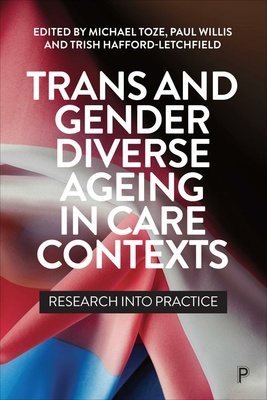It seems almost a cliché to point out that we’re living in an ageing society. In most parts of the world, people are living longer, birth rates are declining, and that raises big questions about how we structure public services and broader society.
We also live in a world where we’re increasingly frequently talking about gender diversity, whether in discussions around formal frameworks for legal recognition and medical interventions, or around more informal social questions such as how we use language to include a range of gender identities.
Yet it still seems relatively uncommon to bring these two conversations together and think about ageing and gender diversity together. Perhaps that’s because there is still a tendency to assume that gender diversity is a very new phenomenon, or that it’s something that only affects younger people. However, terms like ‘transsexual’ and ‘transgender’ were coined several decades ago now, and there are recognisable accounts of gender-diverse life experiences dating back far further.
The England and Wales 2021 census found that while the age profile of people saying their gender identity was different to their birth sex did skew young, around 10 per cent of trans respondents were aged 65+. Clearly, there are older trans, non-binary and gender-diverse people living in our society right now, and it is likely that in the coming years and decades, those who work with older people will become increasingly aware of gender diversity among their service users.
So why is it timely to think about gender diversity and ageing, beyond the fact that we know this population group exists? Firstly, questions about gender and ageing are interesting! We know that there are lots of intersections between ageing, gender, bodies and life experiences in the population as a whole. So what intersections are different, and what stays the same, when we think about ageing in a context where someone may have navigated different parts of their lifecourse with different expressions or experiences of gender, or where their understanding and expression of gender doesn’t align with dominant social norms?
Thinking about ageing can also be useful for thinking about what it is to be trans, non-binary or gender diverse. Popular and media conversations around being trans can tend to emphasise the idea of a single point of ‘transition’, and perhaps on legal and medical decision making that occurs at that time. But that focus can obscure the reality and complexity of complete gender-diverse lifecourses, and the ways in which experiences of trans identity and gender diversity may affect someone at different ages and as they interact with rapidly evolving social contexts.
On a more practical level, as trans and gender-diverse people age, they may have need of ageing services. Contemporary discourses sadly don’t always lend themselves to having inclusive, respectful conversations about gender diversity. This can perhaps lead to apprehension or perception that caring for trans, non-binary and gender-diverse people as they age is in some way a controversial or sensitive topic, or that it is a highly specialist area of service provision. People working in care and ageing services may be uncertain about how to address the topic or feel that it is a difficult conversation to have. However many elements of practical support for this population come down to issues of sensitive and person-centred support that are well established as good practice in ageing care. I think all of us would want to maintain personal choices in issues such as what clothes we wear and how other people address us, as well as feeling confident that we will receive respectful, sensitive care that takes into account our needs and our lived experiences. However, trans, non-binary and gender-diverse people may have more reasons than most to fear that may not happen, perhaps due to administrative systems that still don’t always recognise diversity, or issues such as stereotyping and prejudice.
In coming years and decades, societies and service-providers will increasingly find themselves engaging with the needs of an ageing gender-diverse population. We believe that those should be engaged and inclusive conversations, recognising the diverse ways in which ageing and gender affect us all, and thinking holistically about how later-life services and wider society can build inclusive and flexible support for everyone as they age.
Michael Toze is Senior Lecturer in Public Health and Social Determinants of Health at Lincoln Medical School.
 Trans and Gender Diverse Ageing in Care Contexts edited by Michael Toze, Paul Willis and Trish Hafford-Letchfield is available on the Bristol University Press website. Order here for £27.99.
Trans and Gender Diverse Ageing in Care Contexts edited by Michael Toze, Paul Willis and Trish Hafford-Letchfield is available on the Bristol University Press website. Order here for £27.99.
Bristol University Press/Policy Press newsletter subscribers receive a 25% discount – sign up here.
Follow Transforming Society so we can let you know when new articles publish.
The views and opinions expressed on this blog site are solely those of the original blog post authors and other contributors. These views and opinions do not necessarily represent those of the Bristol University Press and/or any/all contributors to this site.
Image credit Karollyne Videira Hubert via Unsplash


